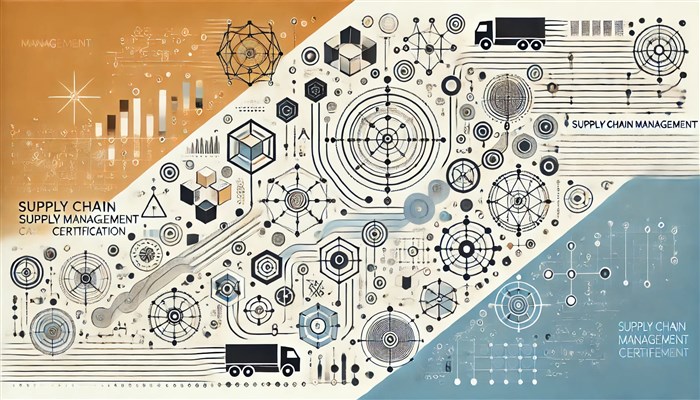
In the rapidly evolving business world, effective supply chain management is a key success factor. Whether you're an industry professional looking to expand your skill set or a fresh graduate aiming to kickstart your career, choosing the right supply chain management certification can significantly impact your career trajectory.
In today’s fast-evolving global economy, supply chain management (SCM) is critical to the success of organizations across industries. Supply chain professionals are responsible for optimizing the flow of goods and services, improving efficiency, and minimizing costs. To stay competitive, individuals in this field need to acquire certifications that demonstrate their expertise and commitment to professional growth.
Selecting the right supply chain management certification can be challenging, especially with the wide range of options available. The right certification can enhance your skills, increase your job prospects, and boost your earning potential. In this guide, we’ll explore how to choose the most suitable SCM certification for your career path, comparing popular certifications like the Certified Supply Chain Professional (CSCP), Certified in Production and Inventory Management (CPIM), and the Chartered Institute of Procurement & Supply (CIPS).
1. Understand Your Career Goals and Industry Focus
The first step in selecting the right SCM certification is to assess your career goals and the specific industry you want to work in. Different supply chain certifications are designed to cater to various areas of expertise within the field, such as logistics, procurement, inventory management, or supply chain strategy.
For example, if you’re aiming to specialize in global supply chain management, the CSCP certification offered by the Association for Supply Chain Management (ASCM) might be the right choice for you. On the other hand, if you are more focused on procurement and purchasing, certifications like CIPS will be more relevant.
Ask yourself:
- Do I want to focus on supply chain planning or operations?
- Am I more interested in procurement and sourcing, or in inventory and logistics?
- Which industries (e.g., manufacturing, retail, healthcare) am I targeting?
Clarifying these questions will help you narrow down your certification options based on your specific interests and professional goals.
2. Consider Your Experience Level
Another important factor to consider is your current level of experience in supply chain management. Some certifications are designed for beginners or entry-level professionals, while others are more advanced and require several years of experience in the field.
For Entry-Level Professionals
If you’re just starting out in the supply chain field or looking to make a career switch, foundational certifications will help you build the essential knowledge needed to advance. Beginner-friendly certifications, such as:
- Certified Supply Chain Professional (CSCP): The CSCP certification from ASCM covers a broad range of supply chain topics and is suitable for individuals who are new to the field. It focuses on the end-to-end supply chain and is ideal for those who want a comprehensive understanding of global supply chain management.
- Certified in Production and Inventory Management (CPIM): The CPIM certification from ASCM is more focused on operations and inventory management. It’s great for those who want to gain expertise in production planning, scheduling, and inventory management.
- CIPS Level 2 Certificate in Procurement and Supply Operations: This certification from the Chartered Institute of Procurement & Supply (CIPS) is perfect for individuals who are new to procurement and supply chain operations. It provides a foundational understanding of procurement processes.
For Mid-Level and Advanced Professionals
If you already have a few years of experience in supply chain management, you may want to pursue a certification that reflects your expertise and helps you move into more specialized or leadership roles. Mid-level certifications like:
- CSCP: While also suitable for beginners, the CSCP certification is a great option for professionals with some experience in supply chain management who are looking to advance into more strategic roles.
- CIPS Level 4 Diploma in Procurement and Supply: This certification is designed for professionals who have experience in procurement and supply and want to deepen their expertise. It is especially valuable for individuals aiming to move into management roles in procurement.
- Certified Professional in Supply Management (CPSM): Offered by the Institute for Supply Management (ISM), this certification is aimed at experienced supply chain professionals who want to focus on procurement and supply management.
3. Compare Popular SCM Certifications
To help you make an informed decision, here’s a detailed comparison of three popular SCM certifications: CSCP, CPIM, and CIPS.
Certified Supply Chain Professional (CSCP)
- Offered by: Association for Supply Chain Management (ASCM)
- Who It’s For: Professionals looking to gain a broad, end-to-end understanding of the global supply chain.
- Focus Areas: CSCP covers supply chain design, planning, execution, monitoring, and improvement. It is ideal for individuals working in global supply chains and looking for an overarching certification that touches on various elements of supply chain management.
- Requirements: CSCP requires at least 3 years of related business experience or a bachelor’s degree.
- Career Impact: This certification is well-recognized globally and can open doors to roles such as supply chain manager, logistics manager, or operations director.
- Ideal Industries: Manufacturing, retail, logistics, and any industry with complex supply chain needs.
- Exam Structure: The CSCP exam consists of 150 multiple-choice questions and takes approximately 3.5 hours to complete.
Certified in Production and Inventory Management (CPIM)
- Offered by: Association for Supply Chain Management (ASCM)
- Who It’s For: Professionals focused on the operational side of supply chain management, including production and inventory control.
- Focus Areas: CPIM is more technical and delves into topics like demand management, material requirements planning (MRP), and supply chain execution.
- Requirements: There are no formal prerequisites for CPIM, but it’s recommended for individuals with some background in operations or manufacturing.
- Career Impact: CPIM is valuable for professionals working in production environments, particularly those involved in planning and inventory management. It prepares you for roles like production planner, inventory analyst, or supply chain analyst.
- Ideal Industries: Manufacturing, industrial production, and any industry reliant on production planning and inventory control.
- Exam Structure: CPIM consists of two parts, each with 150 multiple-choice questions.
Chartered Institute of Procurement & Supply (CIPS)
- Offered by: CIPS (Chartered Institute of Procurement & Supply)
- Who It’s For: Professionals focused on procurement, purchasing, and supplier relationship management.
- Focus Areas: CIPS certifications cover a wide range of procurement and supply chain topics, from sourcing and procurement strategies to supplier evaluation and negotiation.
- Requirements: CIPS offers different levels of certification, ranging from entry-level to advanced. The higher levels may require relevant work experience.
- Career Impact: CIPS certifications are globally recognized and highly respected in procurement and supply chain roles. They can help you secure positions like procurement manager, purchasing director, or supply chain consultant.
- Ideal Industries: Any industry that involves procurement and supplier management, including retail, construction, and government.
- Exam Structure: CIPS certifications include multiple levels, with exams focusing on procurement and supply management topics at each stage.
4. Consider the Financial and Time Investment
Certifications often require both a financial and time commitment. Consider the following:
- Cost: Certifications can range in price, from a few hundred to several thousand dollars, depending on the level of certification and whether you need to purchase study materials or take preparatory courses.
- Study Time: Many certifications require months of study and preparation. Make sure you can dedicate the necessary time to prepare for the exams.
5. Use Study Resources and Exam Preparation Tools
Once you’ve chosen the right certification, it’s important to prepare effectively for the exam. Most organizations that offer certifications also provide study materials, practice exams, and training courses to help candidates succeed.
For example:
- ASCM offers online courses, study guides, and practice exams for both the CSCP and CPIM certifications.
- CIPS provides learning resources and training programs to support professionals at different stages of their certification journey.
Additionally, joining study groups or working with mentors can help you stay motivated and on track with your certification goals.
Choosing the Right Supply Chain Management Certification
When it comes to selecting the right supply chain management certification, one size does not fit all. The choice depends on your career objectives, professional experience, and personal interests. Some of the key factors to consider include:
1. Course Content: Ensure that the supply chain management course covers all the essential topics such as inventory management, procurement, logistics, and demand planning.
2. Accreditation: Choose a widely recognized and accredited certification like the SCM certification that employers value.
3. Mode of Delivery: Decide whether you prefer the flexibility of online courses or the structure of classroom-based learning.
4. Course Duration: Consider the time commitment involved. Some programs may require several months of study, while others can be completed in a matter of weeks.
Why Koenig Solutions?
If you're looking for a leading IT training company that provides certifications in top technology courses, look no further than Koenig Solutions. With a wide range of supply chain management courses designed to cater to different learning needs, Koenig Solutions is the go-to choice for many professionals worldwide.
Conclusion
Choosing the right supply chain management certification requires careful consideration of your career goals, industry focus, experience level, and the time and financial commitment involved. Whether you opt for CSCP, CPIM, or CIPS, obtaining a certification in supply chain management can open doors to new opportunities, enhance your expertise, and increase your earning potential.
By selecting the certification that aligns with your aspirations, you’ll be better equipped to advance in your supply chain career and make a meaningful impact in your organization.







COMMENT